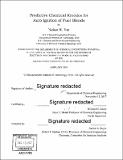Predictive chemical kinetics for auto ignition of fuel blends
Author(s)
Yee, Nathan W. (Nathan Wa-Wai)
DownloadFull printable version (18.86Mb)
Other Contributors
Massachusetts Institute of Technology. Department of Chemical Engineering.
Advisor
William H. Green.
Terms of use
Metadata
Show full item recordAbstract
Predictive chemical kinetics plays an important part in the study of chemical systems by reducing the need for expensive experiments. The size and complexity of modem chemical mechanisms increasingly require the use of automated mechanism generators, such as the Reaction Mechanism Generator (RMG). Use of these automated generators for creating quality chemical mechanisms necessitates accurate reaction rates. Unfortunately, the vast majority of kinetic parameters governing rate constants are not known. The goals of this thesis are the accurate estimation of kinetic parameters and its application to the prediction of auto ignition in fuel blends. At the molecular scale, quantum chemical methods can give kinetic coefficients with accuracy nearing those of experiments. Even when specific kinetic parameters are unavailable, rates can be evaluated by analogy to similar molecules. RMG uses an averaging scheme based on arranging functional groups in a hierarchical tree structure. We have been able to continue expansion of the database to species with nitrogen and sulfur, improve methods for structural representation, and showcase validation for thermochemistry and kinetic parameter estimates. Studying kinetics at the mechanistic level allows insight into the interaction between chemical reactions. Specifically, we have been interested in finding and analyzing the reaction pathways relevant to auto ignition, simplifying well-studied fuel mechanisms for propane and methanol. We were able to define clear stages of ignition and report the controlling chemistry during each stage. Understanding of these base fuels provides the basis to analyzing ignition for larger and more novel fuels. Finally, from a macroscopic perspective we studied ignition for blends of phenolic additives in gasoline. Chemical mechanisms generated by RMG were modeled in a variable volume reactor that emulate end gas conditions of the CRF engine used to evaluate Research Octane Number (RON). We predicted the effect each additive has on the timing of ignition, which were later proven to be reasonably accurate by experimental validation. The chemical pathways that affect the ignition were analyzed and discussed. Finally, we developed a framework for predicting several different aspects of potential fuel additives, which could help eliminate costly experiments by identifying unsuitable candidates before they are even synthesized.
Description
Thesis: Ph. D., Massachusetts Institute of Technology, Department of Chemical Engineering, 2018. Cataloged from PDF version of thesis. Includes bibliographical references.
Date issued
2018Department
Massachusetts Institute of Technology. Department of Chemical EngineeringPublisher
Massachusetts Institute of Technology
Keywords
Chemical Engineering.